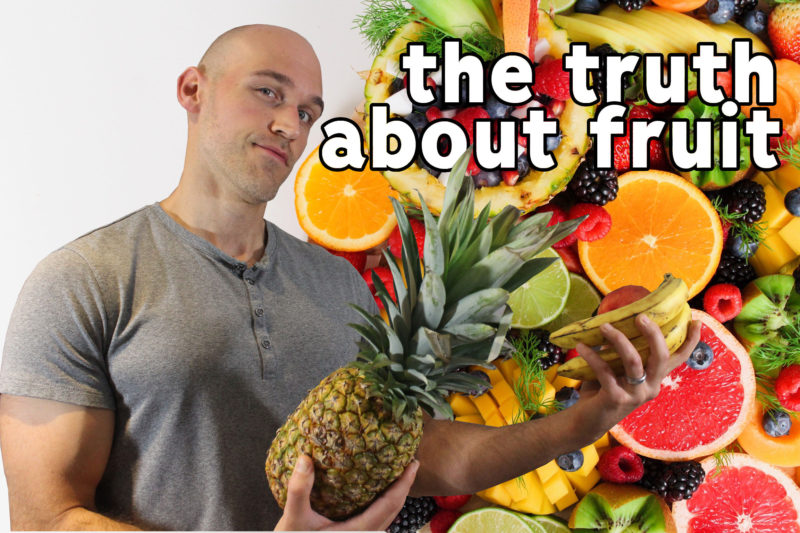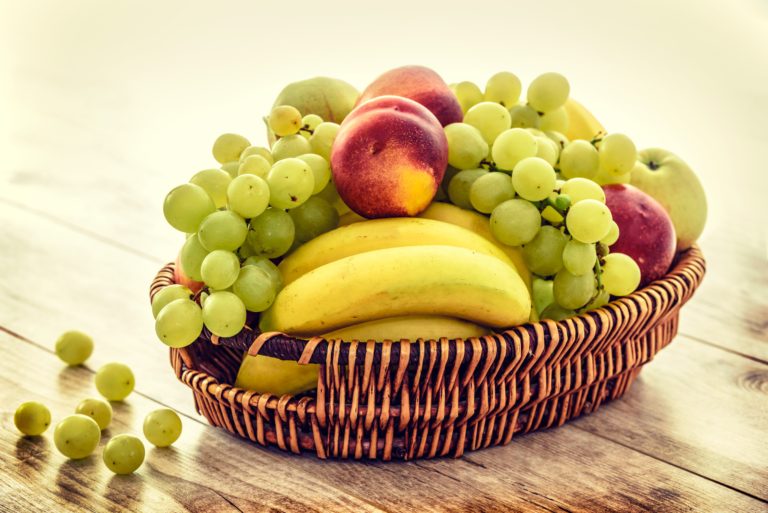
Fruit Make You Fat? The Science Behind The Answer
Fruit has been getting a lot of hate lately. All over the Internet I see questions like:
“Does fruit make you fat?”
“Is fruit really pure sugar?”
“Is fruit bad for you?”
With all the hype around protein in the last few decades, coupled with the low-carb diet fads like Atkins and the ketogenic diet, it’s no wonder why a food rich in carbohydrate such as fruit would receive a bad reputation.
But is it justified? Is fruit really the culprit behind our world’s obesity epidemic?
Spoiler: it’s not. Fruit is actually super healthy. I’m just asking those questions because it’s part of my writing style to build a little suspense in these posts.
It’s time to clear the air on this topic. While fruit is indeed composed of lots of natural sugar, known as fructose, that does not mean it makes you fat. And, on the contrary, an increased intake of whole fruit is actually associated with a decrease in body fat, along with an increase in health and vitality. I’ll explain all that in detail down below.
Too Much Of Anything Makes You Fat… Including Fruit
Fruit does not automatically add fat to your body. I’m honestly not sure where that concept originated, but it’s simply not backed by science.
First of all, in order to gain weight, you need to consume a caloric surplus, which means that you consume more calories than your body has burned throughout the day. The excess energy that you’ve consumed but not burned off is then slowly converted into body fat as part of the metabolic process.
Your body stores body fat for a good reason, believe it or not. Body fat is simply energy stored for later use. So when you consume excess energy (A.K.A. calories), the body says, “Hey, why put this good energy to waste?” and stores it on your belly, hips or any other place we’re all generally unhappy with on our bodies.
With that said, fruit is no exception to this rule. If you consume excess calories from fruit? It gets stored as fat. No different.
So, yes, fruit does make you fat, but only if you consume too much of it (just like any other food)! And it’s actually rather difficult to consume too many calories from fruit, because it’s so high in volume and fiber, yet lower in calories compared to most foods people eat these days.
Don’t believe me? Let me explain further with some science to back it up…
Eating Fruit Helps With Weight Loss
Yes, you read that headline correctly. You can stop rubbing your eyes and squinting at it.
It’s not a typo, either.
Statistics show that more fruit consumption is associated with more weight loss. And one of my favorite studies proving this is a meta-analysis done of 22 different studies.

What’s a meta-analysis? Think of it as the grand daddy of studies. It’s when a statistical analysis is done on the results of multiple studies with a common objective to see what information is true across all the results. In the case I’m referring to, the meta-analysis was done on 22 studies that were investigating the effects of high-fiber diets vs. low-fiber diets.
In a nutshell, the researchers performing the analysis concluded that the high-fiber diets, which included many servings of fruit daily, resulted in significantly more weight loss than the participants on the low-fiber diets. (American Journal of Clinical Nutrition, 2001; 73: 1010)
I share that information because a peer-reviewed biomedical journal such as the American Journal of Clinical Nutrition doesn’t publish bogus data. It’s reliable data that has been studied rigorously. And that’s only the beginning. There are countless other studies out there showing that higher fruit consumption is linked with lower BMI and body composition.
But weight loss is only one benefit of eating more fruit. A lot of people overlook the multitude of other health benefits associated with eating more fruit
Fruit Is Packed With Micronutrients
A lot of people only speak of the macronutrients when they talk nutrition. The macros are carbohydrate, protein and fat. Each of them has an important role in the body, such as providing raw energy for muscle contractions, repairing tissues and regulating hormone production. They are also the source of calories (energy).
However, what’s often overlooked in nutrition these days, is the enormous category of other nutrients known as the micronutrients, which are abundant in fruit.

The micros are your vitamins, minerals, fiber, antioxidants, phytonutrients and other health-promoting compounds that are not associated with calories. They are completely independent of calories.
I could go off on a long diatribe about how the Standard American Diet (SAD) is way too rich in calories and yet practically void of quality micronutrients, but I’ll spare you. That’s a bit off topic, anyway.
Instead, I want you to understand this: Fruit is PACKED with micronutrients.
So many people take multi-vitamin supplements to make up for this void, when in reality, the supplement is an unnecessary expense on the grocery bill. If your doctor tells you to take a multi-vitamin, what they should be telling you is to eat more fruit (and vegetables)!
If you’re curious about which fruits are good sources of which vitamin, you can Google for that information. Plenty of websites out there have all the data displayed in a nice, easy-to-read table. But my advice? Don’t measure and count. Instead, just seek variety. One of the easiest ways to seek variety is to “eat the rainbow,” which is basically a way of saying to eat color variety.
Already had strawberries today? That’s your red. Now move on to blueberries for blue, banana for white, grapefruit for pink, papaya for orange, pineapple for yellow, and so on.
Speaking of eating the rainbow, that’s exactly how our ancestors ate. Let me explain…
Our Ancestors Ate Primarily Fruit
Ever heard the term “sister taxon” before? It’s fine if you haven’t. Most people have never heard it. It’s a term in biology that means “genetically closest related species,” and humans actually have a sister taxa (multiple taxons).
For humans? We’re closest in relation to two species of primates: chimpanzees and bonobos. Their DNA is actually 98.8% identical to ours.

Granted, 1.2% variation in DNA can mean a world of difference, but logically, if you were going to look at any animal species for a guideline to follow for the human diet, it would make sense to study these primates since they’re our closest relatives.
And guess what these two primate species eat the most? You guessed it. Fruit!
Chimps and bonobos eat the following in the wild:
- 92-95% plant material (fruit and leafy vegetation)
- 5-8% animal foods (eggs from bird nests, insects, small rodents, etc.)
The definition of this style of eating in a wild animal is called “omnivorous frugivore.” This means the vast majority of their diet comes from fruit, but they do eat a small amount of leafy vegetation and animal-based foods in addition to that.
The question becomes, why would fruit be bad for us humans if the animal species we evolved from embraces fruit as the vast majority of their diet?
The answer, obviously, is that fruit isn’t bad for us.
Enjoy Your Fruit Guilt-Free
So next time you’re reaching for a piece of fruit and question if it’s a good idea? Don’t question it – just go for it. Our bodies are not only meant to consume fruit, they thrive and keep lean on it. This is not only evident in the fact we evolved from frugivore primate ancestors, but also backed by scientific studies that’ve analyzed fruit consumption in humans.
Remember, fruit is your friend, and now you have a healthy way to satisfy that sweet tooth every day!
Share This Story, Choose Your Platform!